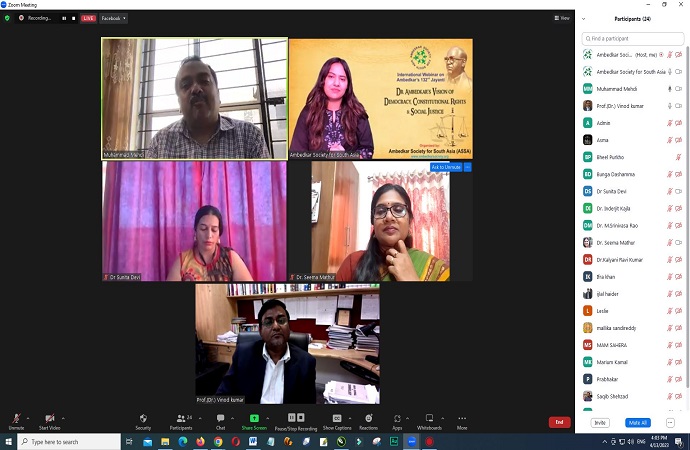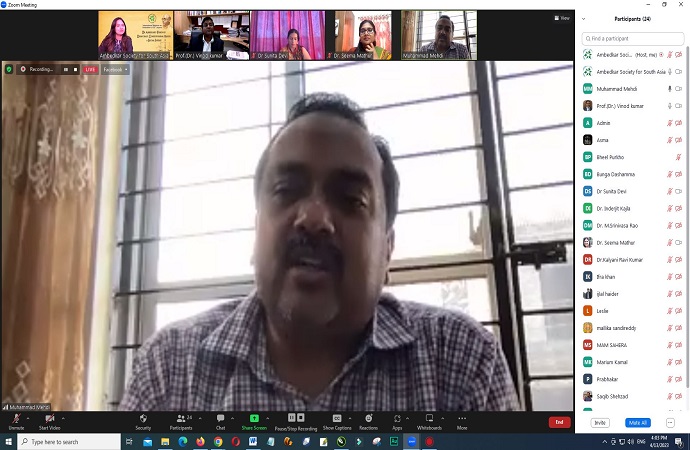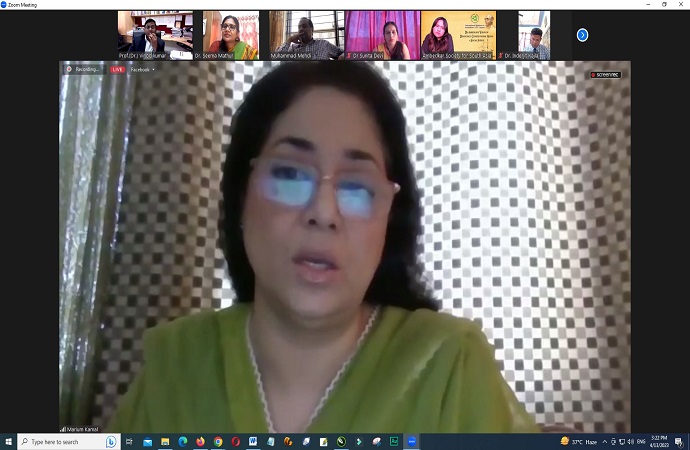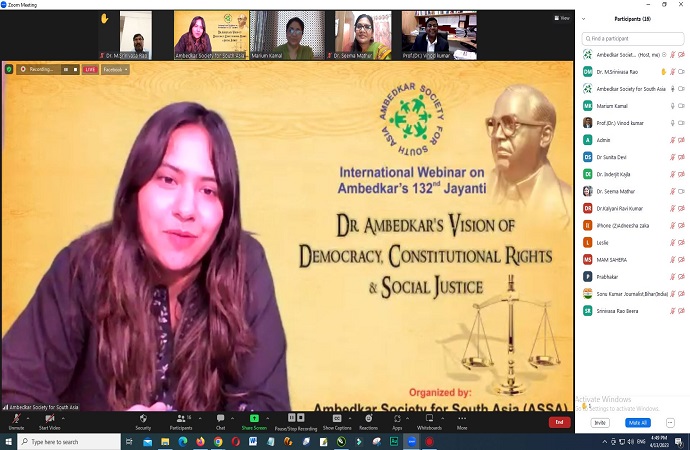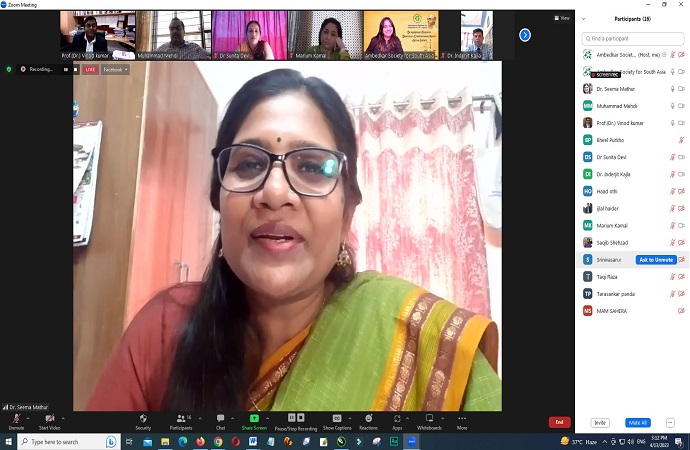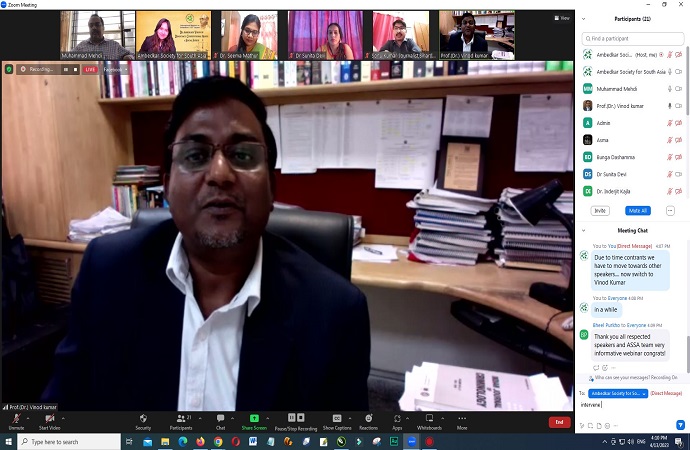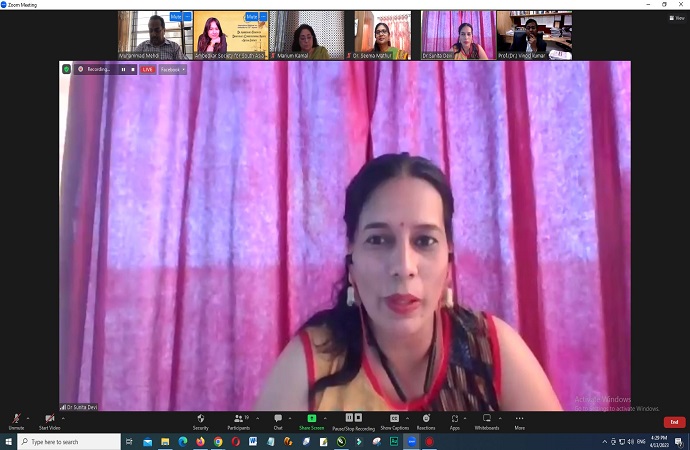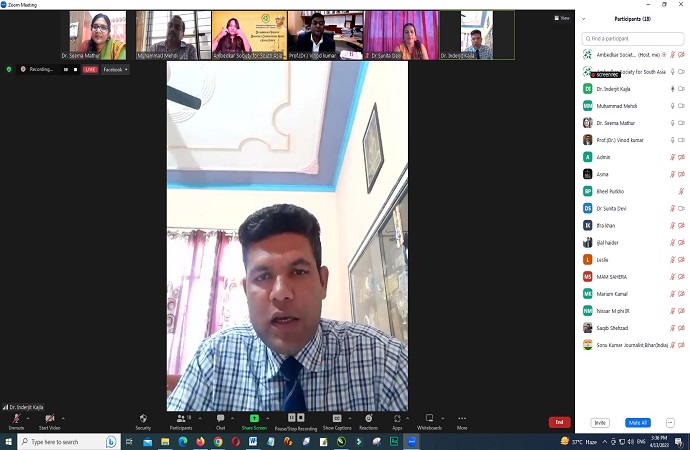Ambedkar Society for South Asia (ASSA) organized an International Webinar in connection with Dr. B. R Ambedkar's 132nd Jayanti entitled *"Dr. Ambedkar's Vision of Democracy, Constitutional Rights & Social Justice"* Following speakers shared their views regarding the topic:
1- Dr. SEEMA MATHUR (Assistant Professor of Political Science, Kalindi College, University of Delhi, India)
2- PROF. DR. VINOD KUMAR (Professor of Law, Director Centre for Human Rights and Subaltern Studies, National Law University (NLU) Delhi, India)
3- DR. SUNITA DEVI (Assistant Professor , Department of Hindi, Dyal Singh College, University of Delhi, New Delhi, India)
4- DR. INDERJIT KUMAR (B.A., LL.B, LL.M., Ph.D, Assistant Professor of Law, St. Soldier Law College, Jalandhar, Punjab, India)
5- MARIUM KAMAL (Assistant Professor , Centre for South Asian Studies , University of the Punjab Lahore, Pakistan)
6- SYED MUHAMMAD MEHDI (Columnist, Daily Jang, Founder Chairman Institute of International Relations and Media Research, Lahore, Pakistan)
Dr. Seema Mathur in her speech said that Dr. B. R Ambedkar's vision of political setup is based upon Equality, Liberty & Fraternity either its democracy or some other form of political setup. He believed that the society is the reflection of the relationship among the people, how they are living and how they interact with each other. She said that our societies here in India, Pakistan, Sri Lanka, Bangladesh have so many differences based on caste, color, creed, language, religion and social status. Though it is called diversity but the society of India particularly based on social ladder with Brahmin at highest position and shudras are at the lowest position and some communities are even out of this hierarchy which is very unfortunate. This is why Babasaheb tried hard to bring such day to day societal reforms which could be helpful to create a just and equal society. So that all people regardless of any differences could get all the fundamental human rights equally. She said that Dr. Ambedkar worked to give dignity to the humanity. Dr. Marium Kamal talked about the social perspective of Ambedkar's vision that is the basis of humanity. She said that Dr. Ambedkar and such South Asian political thinkers who realized and pointed out the basic issues at a very early stage. I believe that now in this century we talk about human security, individualism, human capital development, non-traditional security perspectives and value of the human work contributing, these all perspectives were envisioned by Dr. B. R Ambedkar in that era and he worked practically and he challenged the top hirarchies to accept the people who are under the social certification or under the lower levels and make a place for them in the constitution which was his biggest achievement. Dr. Inderjit Kumar said that when I translated the constitution into Punjabi, I found out during the research that Dr. Ambedkar talked about all the basic human rights in our constitution and gave it the shape of a complete constitution but Baba Sahib did all the difficulties. In his presence, he not only wrote the Indian Constitution but also wrote the Hindu Court Bill. So Baba Sahib wrote this document in 141 days which is the greatest achievement in Indian history, that is why even today Baba Sahib is popular all over the world for his humanitarian services. He always tried to solve the problems of minorities and downtrodden classes and to give them basic rights. In the same way, if women are sitting in the presidency and other important positions in India today, it is all due to Baba Sahib. Because feminism is also present in Ambedkarism because he represented every class of people. Syed Muhammad Mehdi said that Casteism has been a pervasive social issue in South Asia, particularly in India, where the caste system has been deeply rooted in the society for centuries. The caste system is a hierarchical social structure in which people are grouped based on their birth and it determines their social status, occupation and even their marital prospects. Discrimination based on caste has been a significant challenge and it has affected the lives of millions of people. Dr. B. R. Ambedkar fought for the rights of the marginalized and oppressed castes. He envisioned a society based on justice, equality and fraternity. Dr. Ambedkar was instrumental in drafting the Indian Constitution, which guarantees fundamental rights and equality for all citizens, regardless of their caste, creed or gender. His contribution to the emancipation of the downtrodden and marginalized sections of society is unparalleled. He advocated for social reform, education and empowerment to bring about a transformative change in society, paving the way for a more just and equitable future. Dr. Vinod Kumar added that every religion has holy books but we still need a constitution for our countries. It means that constitution is very important for the protection of rights because religion is a regime of duties and constitution is a regime of rights. So the rights written in religious holy books need to be enforced and implemented on the basis of constitution. So Babasaheb Ambedkar was a blessing for India and subcontinent. Dr. B.R. Ambedkar was a prominent leader of the minorities and downtrodden communities in India. He brought attention to the issue of untouchability, which was prevalent in Indian society and was a form of discrimination against the so-called lower castes. Dr. Ambedkar himself had experienced this discrimination, having been born into a lower caste family. He had to overcome significant obstacles to pursue his education and his experiences had a profound impact on his views and his fight for justice. Dr. Sunita Devi said that Dr. Ambedkar's vision of democracy and his efforts to ensure the constitutional rights of all citizens have had a lasting impact on India. His work has been instrumental in the advancement of social justice, the empowerment of marginalized communities and the strengthening of India's democracy. Today, his legacy serves as an inspiration for millions of people who continue to fight for justice and equality in India and around the world. Babasaheb gave a new ideology of democracy and political system that was rooted in the principles of equality, social justice and individual rights. He believed that democracy was not just about political representation but was also about ensuring the well-being of all citizens, especially those who were marginalized and oppressed. Dr. Ambedkar's vision of democracy was different from the traditional understanding of democracy that was prevalent at the time. He emphasized the need for social and economic democracy, where every citizen had access to equal opportunities and resources. He believed that political democracy could only be meaningful if it was accompanied by social and economic democracy.









